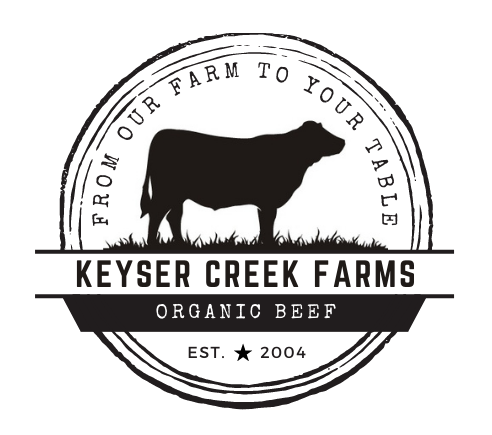CONFESSION: When I studied English in University, everyone asked, "Are you going to be a teacher?" NOPE. I thought it would be cool to help write and edit scientific articles and research papers....
So now you know why I write like I do...
One of the big topics that comes up in the beef (and dairy) industry is hormone use. I'm going to try address that in a little more detail. But it's a big topic - so buckle up! (or scroll past... I'm not offended)
People ask us about hormones quite regularly, and they are often asking a very simple and straight-forward question:
*Do you use hormones on your animals? (100% NO)
DISCLAIMER: As a certified organic farm, we have obviously looked at the information and made our decision where we stand on this issue. But we also think it's very important that people are given the resources to learn and make their own decisions - so even though we obviously are not on board with using hormones, please feel free to read this, read the extra links, do your own research, and make a your own decision whether this is an important topic to you.
More and more people, are questioning if hormone therapies are the healthiest way to raise meat (or dairy), but they don't understand much past that surface level question - and that's okay. We don't expect everyone to delve into the world of animal husbandry, the policies of cattle associations, or our government food standards.
So, just know that it's bigger than "hormones", and the discussion needs to be about "growth promoters" as a whole; and this includes hormonal implants, but also products like ionophores and newer beta agonists.
If you've never heard those terms before,
don't worry - you're not the only one!
There are a few different types of growth promoters: in terms of how they act on the body (ex. stimulate systemic hormonal reaction vs alter digestion), and how they are used (ex. implants vs feed additives).
Here is a link to a Canadian Beef PDF flyer with an introductory "fly-by" of hormone use in the industry:
https://canadabeef.ca/wp-content/uploads/2015/04/3208_CANBEEF_factsheet_HORMONE-2016-P2.pdf
This is why “Do you use hormones?” is no longer an adequate question, and "We're hormone-free" is no longer an appropriate answer. There will always be someone who argues that all animals have hormones of some type; or that NO beef is allowed to be sold with elevated levels of artificial hormones present.... (which are both true, but neither prove growth promoters to be completely safe)
So, let's get some background information on hormone use in the livestock industry, and what we're actually talking about when we say we're "hormone free".
First, I think it's important to point out
that the use of growth promoters
in the beef industry is not a secret.
It's not a shameful, hush-hush thing
that people sell in back alleys
and inject into the animals at night
so they don't get caught.

FACT #1: Use of growth promoters is a legal and approved industry practice. It's true - the products are regulated for use by our government entities, like Health Canada, researched by prominent universities and organizations, and supported by major industry organizations, like Canadian Beef.
For reference, this article is from 2 weeks ago, and speaks to the efficiencies of using growth hormones in calves, so they can be raised to slaughter faster and use less resources:
"The study, jointly conducted by the institute and Manitoba Beef Producers, confirms what years of research already suggest: hormone implants are an effective and economical strategy to promote growth and feed efficiency in suckling calves.
[...]
Those who plan to export beef to the EU cannot use hormone implants and farmers who want to direct-market their own beef as hormone-free would obviously not use the technology.
But Orr said those without those limits are missing a great opportunity if they don’t use it."
The Manitoba Cooperator
https://www.manitobacooperator.ca/livestock/hormones-benefit-young-calves/
Online, we've been accused of trying to scare people into buying our beef by lying about this issue - that we're terrible people because growth hormones are illegal to use in Canada, and we're misleading the general public.
I'm sure they are referring to one particular product called rBGH (recombinant Bovine Growth Hormone), which is now called rBST (recombinant Bovine Somatotropin), that WAS made illegal in 1999. There were obvious problems with the health of the animals who received the treatment; and Health Canada was still going to approve the product. It was only because of a whistleblower named Dr. Shiv Chopra, who lost his job and was vilified for it, that it never came to market.
Anyway, rBST was a product more designed for the dairy industry, rather than beef - but guess what - it's still approved for use in the US! So, if you live near the border and jump across for groceries... maybe think twice about the 4L jug of milk on sale...
I just have to add this here... you're never gonna believe who made this stuff either... Monsanto! True story. I understand that's a bit of an ad hominem dig, but they don’t have a great track record. Always ask more questions!
So, while rBST is illegal in Canada, the use of growth promoters in beef cattle is a common occurrence, particularly in larger feedlots, or CAFOs (Concentrated Animal Feeding Operations). Whether it's a testosterone implant, an ionophore, or a new beta agonist - these are "researched based advancements" that are touted as the saviors of modern livestock agriculture. They will keep the price lower because they can raise animals faster with fewer inputs (aka feed them less), and we'll save our climate at the same time!
Soon enough, I'm sure you'll be hearing that grass-fed farmers are being irresponsible with our natural resources because we don't stock our pastures full enough!
So, in short, Canadian beef - probably the majority
of what goes through grocery stores -
may be raised on farms that use growth promoters.
It's not a myth or a conspiracy theory...
it just is.

FACT #2: The Canadian beef industry has regulations to ensure meat is not sold with hormone levels that exceed a standard set by government authorities.
Also true. All products that are approved for use in the agriculture industry go through our regulatory processes, and have levels that are deemed safe for human consumption. There are rules around when these products can be administered to the animals in relation to when they head to the butchers, and there is a lag time to ensure there are not high trace levels of artificial hormones in the meat.
But, I also think it's fair to ask a couple questions:
- Do I currently trust that these regulatory agencies are looking our for my well-being?
- Do I think the standards being set are free from influence by large corporations who are trying to make profit from their products?
- Does the research look at all the various ripple effects on the animal, or human, from these products? Considering how complex the human body is, is it even possible for our science to do that yet?
- Are there historical examples when regulations and standards have been wrong? Do I have reason to believe this might be the case?
So, when we say we're "hormone-free" we're not speaking about detectable levels of artificial hormones in the meat... we're talking about the general principles of raising healthy animals in accord with their nature throughout their entire life.
We believe the best 'growth promoters'
are a healthy diet and a low-stress environment...
and I think that our cattle and our farm
are a living example of that truth.
It's important to think about the other health effects on the animal that happens while it's on these growth promoters. It's not just about one particular measurement in the final product when it goes out the door. It's more than just a number - we're talking about all around health of the animal throughout their entire life, and the all around quality of the meat.
For comparison, more and more we are learning the dire effects that hormone imbalance has on EVERY human system. Our bodies our connected in a million intricate ways that science hasn't even dreamt up the questions for! So, why would we assume that other complex living beings - with similar hormonal patterns between male and female of their species - would be unaffected when we experiment with them in this way? Yes, it's an imperfect comparison, but maybe there are reasonable associations we can make, and maybe they can point us in the right direction for more research and a better understanding.
So, we KNOW that in humans, hormone imbalance causes a HUGE number of health problems, including (but not limited to):
- appetite and metabolism,
- sleep cycles,
- heart rate,
- sexual function,
- general mood and stress levels,
- and body temperature
Right - we KNOW it causes changes to metabolism - and that's exactly why the beef industry uses growth promoters - to specifically alter their metabolism. But does it have negative effects on any of those other systems?
In humans, here are SOME of the issues hormonal imbalance causes:
- excessive weight gain
- temperature imbalance
- decrease sex drive
- extreme fatigue
- loss of muscle mass
- skin conditions
- digestive problems
Surprise, surprise - excessive weight gain. So strange that happens with the cattle too!?! (Oddly though, it also causes loss of muscle mass.... Hmmm... that could be a whole other topic) But, because it's the desired effect, we turn it into a positive. We don't say, "Oh no, the animal is becoming unhealthy and obese", we say, "Woohoo! Juicier steak!" Because some people choose profit margin, or the efficiencies of production, or the environmental impact as a priority over the health of the animal... then it's okay.
So, at this point I figure there are three possibilities:
a) there actually are no other health effects on cattle
b) they just don't realize that there are other health problems
c) they know, but don't care (or it doesn't matter enough to change minds)
I think you could probably guess where I'm at, but you obviously get to pick what you believe. And if you can think of other options - I'm all ears!
Okay, one last thing...
As an English nerd, I also watch word use very carefully when I'm reading, and I've noticed how things get twisted or misused (and I've probably made those mistakes myself at times). But I think we can all recognize how the word "natural" is intentionally being used in all manner of speaking!
For example, testosterone is a "natural" hormone, so if they are injecting testosterone into the steer to help him grow more muscle faster, then it's not really artificial - you know, because it's a naturally occurring hormone anyway, right?
Well... if it's not something, or some amount, that the animal could produce on it's own, and it only occurs due to an injection from a person... I don't think that counts as 'natural'. So don't let them trick you by side stepping it or talking their way around it. Be sure to define your terms, because their words don't always mean what you think they mean!
At the end of the day,
the health effects on your body
are something you get to deal with.
Ultimately, you have to weigh all the information, check your sources, decide who and what to trust... and ultimately listen to your body... and then decide - does this matter to me?
I think it can all matter.... (told you we raise them side by side!) :)

